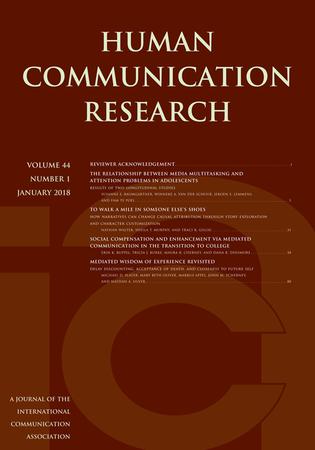关于偏倚的信息会减弱选择性暴露吗?内隐偏见反馈对富外群体新闻选择的影响
IF 4.4
1区 文学
Q1 COMMUNICATION
引用次数: 3
摘要
人们的新闻偏好是由一系列不同的选择偏见塑造的,这些偏见本质上可能是无意识的。这项研究调查了向个体提供有关这种无意识偏见的信息是否会减弱选择性暴露。更具体地说,在两个选择性暴露实验中,在荷兰的内部群体成员中,我们关注种族(N = 286)和宗教(N = 277)少数民族,在记录他们的新闻选择模式之前,我们通过内隐联想测试(IAT)将他们的无意识偏见暴露给个体。研究结果表明,这种意识诱导策略的有效性取决于现有的内隐和外显偏见水平以及对IAT分数的过度接受。这意味着提高对隐性偏见的认识是对抗有偏见的新闻选择的有效策略,但对其他人来说可能适得其反,因此应该谨慎实施,并注意明确的考虑。本文章由计算机程序翻译,如有差异,请以英文原文为准。
Does Information about Bias Attenuate Selective Exposure? The Effects of Implicit Bias Feedback on the Selection of Outgroup-Rich News
People’s news diets are shaped by a diverse set of selection biases that may be unconscious in nature. This study investigates whether providing individuals with information about such unconscious biases attenuates selective exposure. More specifically, in two selective-exposure experiments among Dutch ingroup members focusing on ethnic (N = 286) and religious (N = 277) minorities, we expose individuals to their unconscious prejudices as measured by the Implicit Association Test (IAT) before documenting their news-selection patterns. Findings indicate that the effectiveness of this awareness-inducing strategy depends upon existing levels of implicit and explicit prejudice and overly expressed acceptance of the IAT scores. This implies that raising awareness of implicit prejudice works as an effective strategy for fighting biased news selection for some, but may backfire for others, and should therefore only be implemented with caution and attention for explicit considerations.
求助全文
通过发布文献求助,成功后即可免费获取论文全文。
去求助
来源期刊

Human Communication Research
COMMUNICATION-
CiteScore
8.20
自引率
2.00%
发文量
28
期刊介绍:
Human Communication Research is one of the official journals of the prestigious International Communication Association and concentrates on presenting the best empirical work in the area of human communication. It is a top-ranked communication studies journal and one of the top ten journals in the field of human communication. Major topic areas for the journal include language and social interaction, nonverbal communication, interpersonal communication, organizational communication and new technologies, mass communication, health communication, intercultural communication, and developmental issues in communication.
 求助内容:
求助内容: 应助结果提醒方式:
应助结果提醒方式:


